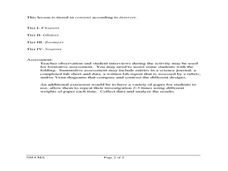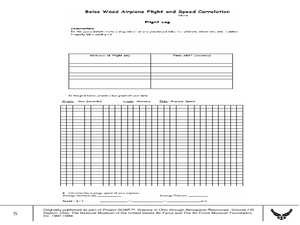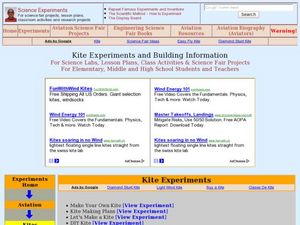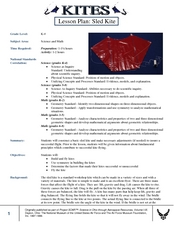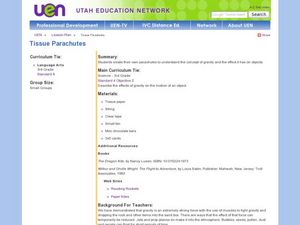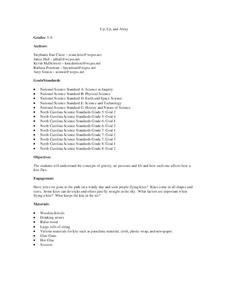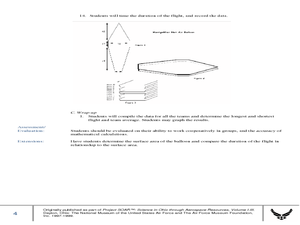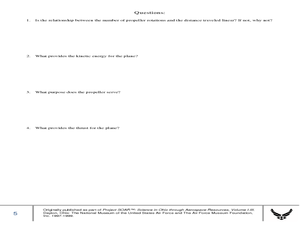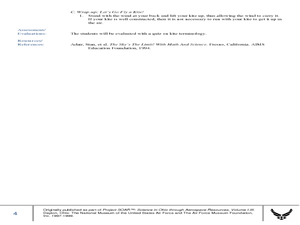Curated OER
The Physics of Flight
Three activities allow young flight engineers to understand the 4 principles of flight (weight, lift, thrust, and drag), to construct a glider, and to create a propeller. Multicultural history and literature are integrated by reading...
Curated OER
The Physics of Flight
Students discuss how the invention of flight changed the way people live today. In groups, they compare and contrast the differences between weight, lift, thrust and drag. Using these principles, they create a glider and propeller with...
Curated OER
Principles Of Flight: Wings That Spin
Students discover how flight is possible. In this physics lesson, students investigate the properties of a blimp and gyro-copter, comparing rotating wings and fixed wings of aircraft. Students create their own model aircraft...
Curated OER
Principles of Flight: Bernoulli's Lift
Students discover how air pressure effects flight. In this physics activity, students create two types of airplane wings so they can observe the way air pressure creates lift. Students utilize a printout to create the...
Curated OER
Origami Flight: The Physical Setting
Sixth graders investigate the forces that move certain objects. In this physics lesson, 6th graders design and create paper flying objects using origami methods, which they practice flying in different conditions. Students...
Curated OER
The Airplane
Learners demonstrate the Bernoulli Principle, review the influences that affected the Wright Brothers, and make and modify paper airplanes. This amazing lesson plan has an excellent structure, and very clear plans for the students to...
Curated OER
Take a Leap!
Eighth graders discuss the flight of the Wright Brothers at Kitty Hawk. They study artwork of various sculptors showing the concept of flight. They write a paragraph and design a papier-mache' sculpture that shows movement.
Curated OER
Balsa Wood Airplane Flight and Speed Correlation
Ninth graders calculate the average speed of their balsa wood airplane. In this physics activity, 9th graders build their own airplane and make necessary modifications to to make it fly straight. They interpret distance and time graph...
Curated OER
Kite Experiments and Building Information
Learners build their own kite following certain procedures. In this physics lesson plan, students explain the aerodynamics concepts involved in flying kites. They trace the development of aviation.
Curated OER
How Things Fly
Students research the mechanics of flight and create a slideshow with one slide dedicated to each of these topics: lift, drag, thrust, and weight. They create a short quiz regarding the material that they presented and give it to their...
Curated OER
Sled Kite
Pupils make and fly a sled kite out of plastic garbage bags, dowel rods, and more. In this kite lesson plan, students plan the kite to have symmetry and make adjustments as they test it.
Curated OER
Motion and Gravity
Third graders make parachutes to learn about gravity and the science process. In this gravity lesson plan, 3rd graders create parachutes and observe their flight in air. Students discuss wind and gravity for the activity.
Curated OER
Up, Up and Away
Tenth graders experiment with gravity and air pressure. In this geometry lesson, 10th graders build their own kits and fly it. They investigate the questions: what keeps a kite in the air and what are some important factors when flying a...
Curated OER
Balloons: Math with the Montgolfier Balloon
Young scholars discover the history of hot air balloons by watching one ascent. In this physics lesson, students utilize a Montgolfier Hot Air Balloon from an earlier lesson and record the temperature, rate of ascent and the...
Curated OER
Mixing and Stirring
Middle schoolers experience mixing through dancing. In this physical science lesson plan, students not only dance to show mixing but also demonstrate mixing and stirring by combining milk and chocolate milk.
Curated OER
How High Can You Fly?
Students learn the four concepts of flight; drag, lift, thrust, and weight. In this scientific inquiry lesson plan, students participate in a flight activity where they jump as high as they can to stamp a large sheet of paper and measure...
Curated OER
Kites: Patang - The Indian Fighter Kite
Students investigate the history of fighter kites and build their own. In this aeronautics lesson, students discover how other countries utilize fighter kites and where they originated. Students create their own fighter kites...
Curated OER
Up, Up and Away with the Montgolfier Balloon
Students construct hot air balloons. In this science lesson, students assemble their own balloon using tissue paper and glue. They time the duration of the flight, record data and calculate team averages.
Curated OER
Parachutes: What a Drag
Sixth graders make 2 different kinds of parachutes and record and graph the time for each one for the different drag forces. In this parachute lesson plan, 6th graders compare the results to the rest of the class of each parachute and...
Curated OER
Power Point Lesson Plan
Young scholars create a multimedia animal research presentation based on the include criteria for both information and sideshow format. They follow directions on slide set-up from creating a slide to transitions and musical insertion.
Curated OER
Hurricane Frequency and Intensity
Students examine hurricanes. In this web-based meteorology instructional activity, students study the relationship between ocean temperature and hurricane intensity. They differentiate between intensity and frequency of hurricanes.
Curated OER
Propellers, Forces and Energy
Students construct a model airplane, measure distance, and calculate velocity. In this creative lesson students work in groups to build a model and use it to calculate distances and velocity.
Curated OER
Preventing Hypothermia
Students identify the causes of hypothermia. In this biology lesson, students investigate the different types of heat transfer and heat loss. They discuss several practical measures to avoid hypothermia.
Curated OER
The Paper Dutch Kite
Students construct a Dutch Kite using simple materials. In this math lesson, students measure kite dimensions according to specified instructions. They also describe and define the different parts of a kite.




